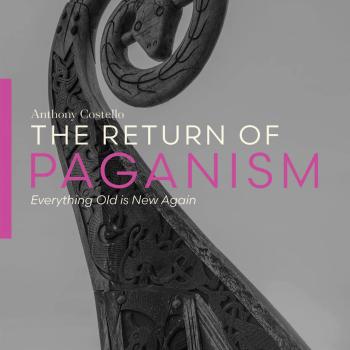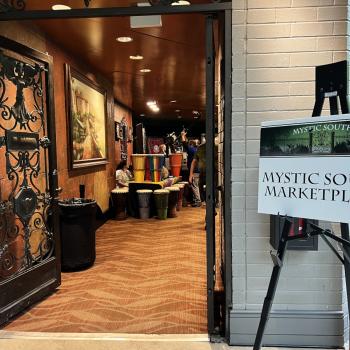The most widely read post on Under the Ancient Oaks last year was Three Messages from Loki to the World. This was my report of a Seiðr oracular ritual at the Mystic South conference where Loki showed up and spoke to the assembly through one of the seeresses. His first message was “cultivate joy.”
That thought has been in the back of my head ever since… sometimes in the front of my head. I was having some difficulties early last year (before this happened) and a respected elder told me to (among other things) “find intentional fun.” Joy and fun aren’t exactly the same things, but they’re close.
Then a couple weeks ago Morgan Daimler wrote The ‘Great War’: Unmaking vs Making. That’s a powerful piece and I’m still thinking through how I want to respond to Morgan’s main point. But they brought this point up too, concluding with advice to “focus on embracing … breath and life and joy where it can be found.”
Sounds like joy is pretty important.
How do we embrace joy, find joy, cultivate joy?
I’m going to offer a suggestion that will be counterintuitive to many of you – maybe to most of you. But it works for me. Most times, it’s all that does work for me.
If we want experience joy, we have to make time for joy. And for most of us, the only way to make time for joy is to schedule it well in advance.
Can we really schedule joy?
Let’s start by admitting the obvious: you can’t schedule joy in the way you can schedule a doctor’s appointment or a restaurant reservation. Joy comes in its own time.
What we can do is to put ourselves in a place where joy is likely to find us, where we’re likely experience it. Like ecstatic experiences, joy can’t be commanded, but it can be facilitated.
And the actions that facilitate joy can be scheduled.
Spontaneity is wonderful but unreliable
When I was very young (what seems like a hundred years ago) the buzzword for everything was “spontaneous.” Anything worthwhile had to be spur of the moment, off the top of your head, unsolicited. Anything that was planned in advance was “forced” and “fake.”
Even as a kid, I never really understood that. I’ll freely admit that when good things happen spontaneously it’s amazing. But they happen so rarely, because we’re rarely in a position where they can happen.
The insistence on spontaneity in the late 1960s and early 1970s was part of a desire for a society unencumbered by the structures that claim so much of our time: work, school, and such. Whether that desire was a naïve daydream or a better alternative to the mainstream American lifestyle is another topic for another time. What matters for us here and now is those structures are still here and they’re likely to be there for a very long time. We don’t have to like them (though they have their advantages) but we do have to deal with them.
And that means if we insist that all joy be spontaneous, we’re going to be joyless most of the time.
Who has time for joy, anyway?
Like most adults, I spend a huge chunk of my time working a day job, to get the money I need to live. Then there’s another huge chunk spent on the necessities of living: grocery shopping, cooking (or just grabbing takeout, which is faster but still not free), cleaning, car maintenance, and such. I don’t have kids (which is the main reason I have time to write) but many people do. And then there are the things we have to do to sustain our bodies and our souls: sleeping, eating, bathing, spiritual practice. When all that’s done, I need some relaxation – that usually means some form of entertainment.
And then it’s time for bed, to get ready to do it all again the next day.
This isn’t exactly slavery. This routine has allowed me to build a life that is about as secure as is possible in 21st century America without being born into wealth. It’s a lot easier than the lives my ancestors lived. It’s fulfilling, at least in some ways.
But it doesn’t leave much room for joy.
Joy comes from doing, not from having
I haven’t defined joy. I’m not sure I can. The dictionary says it’s “a feeling of great pleasure and happiness.” But I know it when I feel it – when I experience it.
And I’ve experienced it enough to know that it comes from doing, not from having.
Having nice things – especially useful and reliable things – can bring satisfaction. My first car was a $600 piece of junk. My current Honda is nicer than the luxury cars of my childhood and far more reliable. I live in a place where cars are a necessity – having a good car brings me satisfaction (that, and the fact that my Mercedes demon faded away some years ago). But it doesn’t bring me joy. It’s just a tool, just a thing (as an animist I wonder if it’s more than a thing, but even if it is it still doesn’t bring me joy).
Travel brings me joy. Conversation with friends over food and drink brings me joy. Leading public ritual brings me joy. So does reading really good books. So do other things, some of which I can’t quite articulate.
Travel is expensive, but most other things that bring joy aren’t.
But they all require time.
Make time for the things that bring you joy
The cliché that “everybody has the same 24 hours in a day” is a lie. If you work from home, you have more time than someone who has a long commute. If you have someone to cook and clean for you, you have more time than someone who has to do these things on top of their paying job. But almost all of us have some discretionary time in our lives.
Use some of it for joy.
Think about what’s brought you joy in the past – how can you do it again? Think about your dreams and desires – what do you really want to do? Or at least, what do you think you really want to do?
Schedule time for it. Put it on your calendar. Set a reminder on your phone. If it involves other people, send out invitations… or at least, call or text and see when people are available.
Joy comes in its own time. You may schedule something and your plans fall apart. You may do it and it turns out it wasn’t what you expected. It may be quite nice but still fall short of joy.
Or it may be a wonderful, fulfilling, joyous experience.
But if you don’t make time for joy, if you don’t put yourself in a situation where joy can happen, you’re guaranteed to not experience it.
Schedule time for the things that bring you joy.
Take risks that may bring joy
One of the reasons some people insist that joy must be spontaneous is that the things we think will bring us joy often don’t. “You can’t schedule joy” prevents the disappointment that comes when big plans don’t turn out the way we expected, or the way we hoped.
Like so many others, during the pandemic I binge-watched comfort movies. That’s not a bad thing – there’s a place for comfort movies, comfort foods, comfort activities. But I was missing the opportunity for something new and better. So I set An October Viewing and Reading Challenge, to read and watch some new stuff – to take a risk that something new might be disappointing for the chance that it might be really good.
It went very well.
Take risks with new travel destinations, new food and drink, new activities… and new relationships.
Be willing to fail for the chance of joy.
Joy isn’t fair – do the work anyway
There is wisdom in the old saying “if you want something done right, do it yourself.” That’s not fair, but it is true.
Many – perhaps most – of the activities that bring joy require other people. Other people can be problematic (but see “take risks” above). And other people can fail to reciprocate.
You set up a nice dinner with friends, everyone enjoys it and says you should do it again. And then you wait, and wait, and wait for someone to take the next turn and schedule the next dinner.
Maybe what was joy for you was just a bit of fun for them. Maybe they don’t have the organizational skills you have.
Or maybe they don’t understand the importance of scheduling joy.
At the end of the day it comes down to this: do you want to do it or not?
At some point, you may start to feel like other people are taking advantage of you and the joy will go out of the activity. In that case, it’s time to drop out. But until then, if you want joy, you may have to be the person who puts people in a place where joy can find them – and you.
This is how we cultivate joy
I can’t read the news without feeling beaten down, and I’m a straight white cis man with a middle class job. I can only imagine how bad it is for more vulnerable people. I’m doing what I can to address these problems directly, but there’s only so much any one person can do.
And there’s only so long any of us can go before we get burned out and become useless to the cause of building a better world.
We need joy in our lives.
We need joy in our lives so badly that a God jumped into a seeress to remind us to cultivate joy.
Joy can’t be commanded, but it can be facilitated.
We can never be sure we’ll experience joy, but we can put ourselves in places where joy can find us.
Let’s cultivate joy, in our lives and in the lives of those around us.
And that begins with scheduling joy.





















